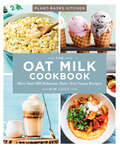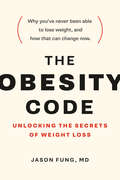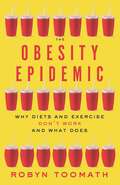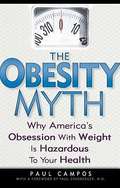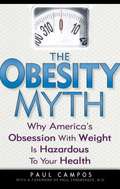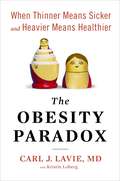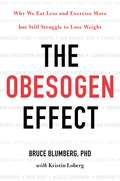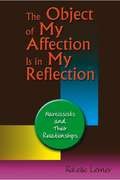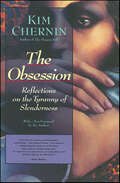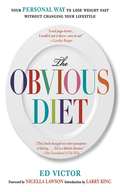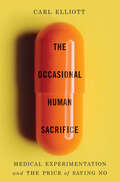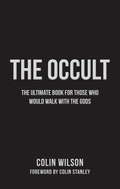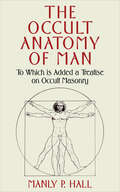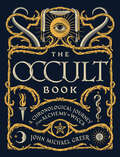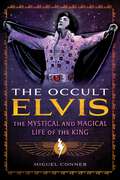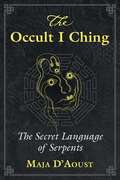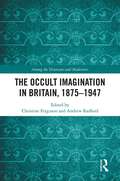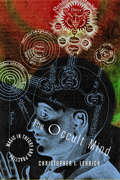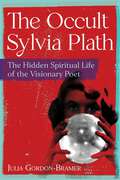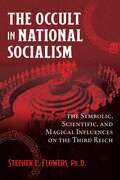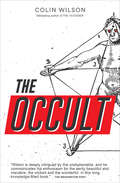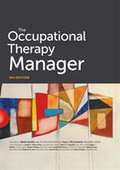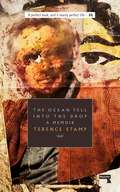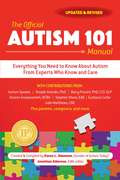- Table View
- List View
The Oat Milk Cookbook: More than 100 Delicious, Dairy-free Vegan Recipes (Plant-Based Kitchen #1)
by Kim LutzOat milk is the latest trend in healthy gut food, and this easy-to-use cookbook helps you enjoy its benefits with more than 100 delicious recipes—all naturally free of dairy and lactose. Oat milk, as a vegan alternative to cow&’s milk, is gaining widespread popularity due to its delicious flavor and impressive nutrient profile as an excellent source of calcium, Vitamin D, and heart-healthy fiber. Plus, it&’s naturally free of lactose, making it ideal for anyone with dietary restrictions, allergies, digestive distress, and other gut troubles. These 100 recipes will make oat milk an everyday ingredient in all the foods you crave—without compromising flavor! You&’ll find a wide array of mouthwatering, easy-to-make dishes, including rich desserts, snacks, smoothies, and of course main meals.Recipes include: Delicious breakfasts, such as Strawberry Almond Overnight Oats, Vegan French Toast, and Spinach-Artichoke StrataLunches and dinners, including Black Bean Cakes, Spicy Eggplant and Brown Rice with Oat Milk, Mediterranean Stew with Creamy Polenta, and even NachosSoups, salads, and sides, from Butternut Squash Soup and Curry Chickpea Salad to Green Bean Casserole and Creamed SpinachDips, sauces, and spreads—Red Lentil Dip, Chipotle Spread, Vegan Date Caramel Sauce, and Chocolate Hazelnut ButterYummy desserts, including Oatmeal Chocolate Chip Cookies, Peach Blueberry Cobbler, and Vanilla Cake with Chocolate FrostingPlus a special &“Oat Milk Coffeehouse&” section with recipes for fantastic lattes, and another section with baked goods to accompany the coffees
The Obesity Code: Unlocking the Secrets of Weight Loss
by Timothy Noakes Dr Jason FungEverything you believe about how to lose weight is wrong. Weight gain and obesity are driven by hormones-in everyone-and only by understanding the effects of insulin and insulin resistance can we achieve lasting weight loss.In this highly readable and provocative book, Dr. Jason Fung sets out an original, robust theory of obesity that provides startling insights into proper nutrition. In addition to his five basic steps, a set of lifelong habits that will improve your health and control your insulin levels, Dr. Fung explains how to use intermittent fasting to break the cycle of insulin resistance and reach a healthy weight-for good.
The Obesity Epidemic: Why Diets and Exercise Don't Work—and What Does
by Robyn ToomathWhy modern life makes it almost impossible for people to lose weight and keep it off.In a world where charlatans promise to fix the alarming obesity epidemic with a silver-bullet diet or trendy new exercise program, Robyn Toomath, a physician and realist, steps out of the fray to deliver some tough news: it’s really hard to lose weight. Dispelling common myths and telling provocative truths about weight gain—and loss—The Obesity Epidemic is an engaging investigation into the complicated factors that lead to obesity. While genes certainly play a part, Toomath argues, more people are fat than ever before because most of us consume significantly more calories than we did 30 years ago. But why? The answer, she asserts, is the commodification of food created by junk food advertising coupled with urbanization, globalization, and trade agreements. And while government, advertisers, gyms, and the weight loss industry keep pushing solutions that science shows do not work—from extreme exercise regimens and fad dieting to prohibitively expensive surgeries, pills, and misguided education campaigns—Toomath outlines what just might make a difference in terms of helping people truly control their weight.Drawing on the latest research and her twenty years of working with overweight patients, Dr. Toomath argues that even strongly determined people who are offered appealing incentives typically cannot lose weight permanently. Instead of demonizing people by treating weight as an issue of personal or even moral responsibility, Dr. Toomath makes it clear that nothing will change until we make it easy, not all but impossible, for people to eat healthily. Raising important questions about obesity, Toomath sidesteps the standard sound bites and puts an end to the myth of personal responsibility for body size by focusing on the environment all around us.
The Obesity Myth
by Paul CamposIs your weight hazardous to your health? According to public-health authorities, 65 percent of us are overweight. Every day, we are bombarded with dire warnings about America's "obesity epidemic." Close to half of the adult population is dieting, obsessed with achieving an arbitrary "ideal weight." Yet studies show that a moderately active larger person is likely to be far healthier (and to live longer) than someone who is thin but sedentary. And contrary to what the fifty-billion-dollar-per-year weight-loss industry would have us believe medical science has not yet come up with a way to make people thin. After years spent scrutinizing medical studies and interviewing leading doctors, scientists, eating- disorder specialists, and psychiatrists, Professor Paul Campos is here to lead the backlash against weight hysteria--and to show that we can safeguard our health without obsessing about the numbers on the scale. But The Obesity Myth is not just a compelling argument, grounded in the latest scientific research; it's also a provocative, wry exposé of the culture that feeds on our self-defeating war on fat. Campos will show: How the nation's most prestigious and trusted media sources consistently misinform the public about obesity What the movie industry's love affair with the "fat suit" tells us about the relationship between racial- and body-based prejudice in America How the skinny elite--with their "supersized" lifestyles and gas-guzzling SUVs--project their anxieties about overconsumption on the poorer and heavier underclass How weight-loss mania fueled the impeachment of Bill Clinton In this paradigm-busting read, Professor Campos challenges the conventional wisdom regarding the medical, political, and cultural meaning of weight and brings a rational and compelling new voice to America's increasingly irrational weight debate.
The Obesity Myth: Why America's Obsession with Weight is Hazardous to Your Health
by Paul CamposThe Obesity Myth should be required reading for every health professional in America. I believe any open-minded person who reads this book will conclude that we have been duped by a pack of self-serving lies.
The Obesity Paradox
by Carl J. LavieMost of us think that longevity hinges on maintaining a normal Body Mass Index. But research conducted over the last decade hit the media in January with explosive news: Overweight and even moderately obese people with certain chronic diseases#151;from heart disease to cancer#151; often live longer and fare better than normalweight individuals with the same ailments. In this groundbreaking book, Carl Lavie, MD, reveals the science behind the obesity paradox and shows us how to achieve maximum health rather than minimum weight. Lavie not only explains how extra fat provides additional fuel to help fight illness, he also argues that we’ve gotten so used to framing health issues in terms of obesity that we overlook other potential causes of disease. Picking up where the bestseller Fat Chance left off, The Obesity Paradox will change the conversation about fat#151;and what it means to be healthy.
The Obesogen Effect: Why We Eat Less And Exercise More But Still Struggle To Lose Weight
by Kristin Loberg Bruce BlumbergAn eye-opening account of the landmark research into the hidden chemicals that are endangering our health and keeping us fatBeing overweight is not just the result of too many cheeseburgers or not enough exercise. According to leading-edge science, there are silent saboteurs in our daily lives that contribute greatly to our obesity epidemic: obesogens. These weight-inducing offenders, most of which are chemicals, disrupt our hormonal systems, alter how we create and store fat, and change how we respond to dietary choices. Because they are largely unregulated, obesogens lurk all around us-in food, furniture, plastic products such as water bottles and food storage containers, and other surprising exposure points. Even worse: research has shown that the effects of some obesogens can be passed on to future generations by irreversibly interfering with the expression of our genes. The good news is we can protect ourselves by becoming more informed consumers. In THE OBESOGEN EFFECT, Dr. Bruce Blumberg describes how obesogens work, reveals where they are found, and offers a practical three-step solution for reducing exposures. He explains why one size does not fit all in a weight loss program, what hides in our household goods, and how we should shop for items we buy every day-from vegetables and meats to canned soup as well as household cleaners, air fresheners, and personal care products. THE OBESOGEN EFFECT is an urgent call to action to protect your body, clean up your life, and set a straight course for better health.
The Object of My Affection is in My Reflection: Coping with Narcissists
by Rokelle LernerNarcissists suffer from a personality disorder that began in the early stages of childhood. They are stuck in an early development stage where there is tremendous self-interest, excessive self-absorption, and extreme entitlement. Their behavior is a consequence of early childhood abandonment and abuse. ''The Object of My Affection Is in My Reflection'' will help you understand the complexities of this disorder and arm you with the coping mechanisms to navigate through this type of relationship.
The Observing Self: Mysticism and Psychotherapy
by Arthur J. DeikmanUnderstanding the mystical tradition from the perspective of modern developmental psychology and psychodynamic theory.
The Obsession: Reflections on the Tyranny of Slenderness
by Kim CherninThe Obsession is a deeply committed and beautifully written analysis of our society's increasing demand that women be thin. It offers a careful, thought provoking discussion of the reasons men have encouraged this obsession and women have embraced it. It is a book about women's efforts to become thin rather than to accept the natural dimensions of their bodies--a book about the meaning of food and its rejection.
The Obvious Diet: Your Personal Way to Lose Weight Without Changing Your Lifestyle
by Larry King Nigella Lawson Ed VictorAt last, a diet so obvious, it works! Literary agents are famous for lunching, and there is no more famous agent than Ed Victor. If Ed can lose twenty pounds in three months without changing his lifestyle, so can everyone! The Obvious Diet recognizes that the rules you make yourself are the rules you are most likely to stick to. It shows you how to devise an eating regimen that is based on avoiding your own particular weakness, whether that is carbohydrates, animal fats, or sugar. It works because, rather than imposing a rigid plan from on high, it allows you to mix and match elements from different diets to suit your own lifestyle. If you have tried many diets over the years but found they didn't work, than this is the book for you. With ideas and advice from Ed Victor's celebrity friends and clients, the book provides anecdotes and inspirational tips to help you stick to your plan. Mel Brooks, Anne Bancroft, Tina Brown, Sidney Sheldon, Andrew Lloyd Webber, and many more contribute their recipes and words of wisdom. Dieting has never been this interesting! Millions of Americans are overweight and want to do something about it. If a gourmand like Ed Victor can do it, so can you!
The Occasional Human Sacrifice: Medical Experimentation and the Price of Saying No
by Carl ElliottShocking cases of abusive medical research and the whistleblowers who spoke out against them, sometimes at the expense of their careers. The Occasional Human Sacrifice is an intellectual inquiry into the moral struggle that whistleblowers face, and why it is not the kind of struggle that most people imagine. Carl Elliott is a bioethicist at the University of Minnesota who was trained in medicine as well as philosophy. For many years he fought for an external inquiry into a psychiatric research study at his own university in which an especially vulnerable patient lost his life. Elliott’s efforts alienated friends and colleagues. The university stonewalled him and denied wrongdoing until a state investigation finally vindicated his claims. His experience frames the six stories in this book of medical research in which patients were deceived into participating in experimental programs they did not understand, many of which had astonishing and well-concealed mortality rates. Beginning with the public health worker who exposed the Tuskegee Syphilis Study and ending with the four physicians who in 2016 blew the whistle on lethal synthetic trachea transplants at the Karolinska Institute, Elliott tells the extraordinary stories of insiders who spoke out against such abuses, and often paid a terrible price for doing the right thing.
The Occult
by Colin WilsonColin Wilson's great classic work is a comprehensive history of mystery and "magic". His genius lies in producing a skilful synthesis of the available material; clarifying without simplifying, seeing the occult in the light of reason and reason in the light of the mystical and paranormal. It is a journey of enlightenment - a wide-ranging survey of the whole subject and an insightful exploration of Man's latent powers. Republished two years after the author's death and with a new foreword by bibliographer Colin Stanley, Wilson brings his own refreshingly optimistic and stimulating interpretation to the worlds of the paranormal, the occult and the supernatural. "The Occult is the most interesting, informative and thought-provoking book on the subject I have read" --Sunday TelegraphFrom the Trade Paperback edition.
The Occult Anatomy of Man: To Which Is Added a Treatise on Occult Masonry
by Manly Palmer HallIn this eclectic text, noted lecturer and mystic Manly P. Hall offers a mythicist interpretation of Christian origins, suggests Lemurian and Atlantean sources lie behind its esoteric traditions, provides a detailed discussion of clairvoyance and mediumship, explores the symbolism of color and the cyclical nature of human development.
The Occult Book: A Chronological Journey from Alchemy to Wicca (Union Square & Co. Chronologies)
by John Michael GreerExplore the occult from ancient times to the modern day with one of its most respected scholars and practitioners. Take an enlightening journey through occult history, exploring 100 dramatic incidents, arcane knowledge, and key historical figures from around the world. John Michael Greer delves into two millennia of tradition, from the earliest alchemists to pagan rituals; from the Philosopher&’s Stone to Cabala, the first tarot, and the Knights Templar; and from the first horoscopes to fortune-telling trials and the birth of modern witchcraft, or Wicca. Each entry features a stunning image or intriguing item of ephemera.
The Occult Elvis: The Mystical and Magical Life of the King
by Miguel Conner&“A lively new book.&” —The Guardian• Draws on firsthand accounts from Elvis&’s wife, Priscilla, his friends and family, the Memphis Mafia, and his spiritual advisors• Looks at key teachers who influenced him, including Yogananda, H. P. Blavatsky, and Manly P. Hall• Examines Elvis&’s efforts as a natural healer, the significance of his UFO encounters, and his telekinetic, psychic, and astral traveling abilitiesElvis Presley, the most successful solo artist in history and an emblematic cultural figure of the Western world, has been widely perceived as a conservative Southern Christian. However, the truth about the man has been missed.Writer and researcher Miguel Conner reveals how Elvis was a profound mystic, occultist, and shaman. Beginning with the unusual circumstances of his birth—and his stillborn twin brother—Conner traces the diverse thread of mysticism that runs through Elvis Presley&’s life, drawing on firsthand accounts from the people closest to him, including his wife, Priscilla, the Memphis Mafia, and his spiritual advisors. He shows how Elvis studied seminal 19th- and 20th-century occultists, including H. P. Blavatsky, Manly P. Hall, G. I. Gurdjieff, and P. D. Ouspensky, and was a devotee of Indian yogi Paramahansa Yogananda. Conner argues that Elvis was well-versed in the esoteric practices of sex magic, meditation, astrology, and numerology and had a deep familiarity with Kabbalah, Gnosticism, Theosophy, and Eastern traditions. He also reveals how Elvis was a natural healer, telekinetic, psychic, and astral traveler who had significant mystical experiences and UFO encounters.Looking at the conspiratorial and paranormal aspects of Elvis&’s life, the author explores the "Elvis visitations" that have occurred since the King&’s death and the general high weirdness of his life. As Conner convincingly argues, Elvis was not just a one-of-a-kind rock-and-roller. He was the greatest magician America ever produced.
The Occult I Ching: The Secret Language of Serpents
by Maja D’AoustAn illustrated guide to the occult history, serpent magic, and practical application of the I Ching • Reveals how the sacred language of the original eight trigrams of the I Ching was discovered by a wisdom serpent known as Fu Xi • Explores how the I Ching formed the basis of the earliest Taoist philosophies, its complex correlation with human DNA, and its relationship with artificial intelligence • Provides new contemporary analysis of each of the 64 hexagrams, their changing lines, and archetypes of the I Ching • Includes original artwork highlighting the serpent magic within the system and tools to help you interpret the I Ching based on your own individual experience One of the oldest books in the world, the I Ching has been used in China for millennia to open a dialogue with divinity, gain insight and wisdom, and pull aside the curtain of reality to reveal the light of the heavens. Yet, despite its popularity over thousands of years, few understand its mysterious origins, symbolism, or occult connections. In this illustrated guide, Maja D&’Aoust applies her significant experience as a professional practitioner and scholar of the I Ching to provide a history of the oracle, explain the mechanisms at work behind it, and offer a new experiential approach to its interpretation. The author begins by examining the discovery of the I Ching by the first mythical emperor of China, Fu Xi, a divine being with the body of a serpent. She reveals how Fu Xi&’s eight original trigrams, also called the Ba Gua, provided a sacred language of symbols that allowed for communication between the diviner and the spirit world. Using the I Ching&’s principles of cosmology as a basis, the shamans of ancient China developed the earliest Taoist philosophies of nature, medicine, martial arts, and mathematics as well as ecstatic practices, war strategies, birth and death rituals, agricultural systems, and alchemical studies. D&’Aoust further shows how the I Ching relates to the mathematical sequences of biology and human DNA, examining the correlation between the serpent&’s tail and the double helix. She reveals how the ways the oracle connects with your own inner knowing parallel the ways in which DNA repairs itself. Providing a new analysis of each of the 64 hexagrams and their changing lines and archetypes, the author explores each hexagram&’s meanings in depth, alongside original artwork highlighting the serpent magic within the system and tools to help you interpret the I Ching based on your own individual experience. Revealing how the oracle holds complex networks of meaning that language alone fails to capture, D&’Aoust offers a new understanding of the Book of Changes and its many hidden lessons.
The Occult Imagination in Britain, 1875-1947 (Among the Victorians and Modernists)
by Andrew Radford Christine FergusonBetween 1875 and 1947, a period bookended, respectively, by the founding of the Theosophical Society and the death of notorious occultist celebrity Aleister Crowley, Britain experienced an unparalleled efflorescence of engagement with unusual occult schema and supernatural phenomena such as astral travel, ritual magic, and reincarnationism. Reflecting the signal array of responses by authors, artists, actors, impresarios and popular entertainers to questions of esoteric spirituality and belief, this interdisciplinary collection demonstrates the enormous interest in the occult during a time typically associated with the rise of secularization and scientific innovation. The contributors describe how the occult realm functions as a turbulent conceptual and affective space, shifting between poles of faith and doubt, the sacrosanct and the profane, the endemic and the exotic, the forensic and the fetishistic. Here, occultism emerges as a practice and epistemology that decisively shapes the literary enterprises of writers such as Dion Fortune and Arthur Machen, artists such as Pamela Colman Smith, and revivalists such as Rolf Gardiner
The Occult Mind: Magic in Theory and Practice
by Christopher I. Lehrich"Given the historical orientation of philosophy, is it unreasonable to suggest a wider cast of the net into the deep waters of magic? By encountering magical thought as theory, we come to a new understanding of a thought that looks back at us from a funhouse mirror. "-from The Occult Mind Divination, like many critical modes, involves reading signs, and magic, more generally, can be seen as a kind of criticism that takes the universe-seen and unseen, known and unknowable-as its text. In The Occult Mind, Christopher I. Lehrich explores the history of magic in Western thought, suggesting a bold new understanding of the claims made about the power of various belief systems. In closely interlinked essays on such disparate topics as ley lines, the Tarot, the Corpus Hermeticum, writing and ritual in magical practice, and early attempts to decipher Egyptian hieroglyphics, Lehrich treats magic and its parts as an intellectual object that requires interpretive zeal on the part of readers/observers. Drawing illuminating parallels between the practice of magic and more recent interpretive systems-structuralism, deconstruction, semiotics-Lehrich deftly suggests that the specter of magic haunts all such attempts to grasp the character of knowledge. Offering a radical new approach to the nature and value of occult thought, Lehrich's brilliantly conceived and executed book posits magic as a mode of theory that is intrinsically subversive of normative conceptions of reason and truth. In elucidating the deep parallels between occult thought and academic discourse, Lehrich demonstrates that sixteenth-century occult philosophy often touched on issues that have become central to philosophical discourse only in the past fifty years.
The Occult Sylvia Plath: The Hidden Spiritual Life of the Visionary Poet
by Julia Gordon-Bramer• Decodes the alchemical, Qabalistic, hermetic, spiritual, and Tarot-related references in many of Plath&’s poems• Based on more than 15 years of research, including analysis of Plath&’s unpublished personal writings from the Plath archives at Indiana University• Examines the influences of Plath&’s parents, her early interests in Hermeticism, and her and husband Ted Hughes&’s explorations in the supernatural and the occultSharing her more than 15 years of compelling research—including analysis of Sylvia Plath&’s unpublished calendars, notebooks, scrapbooks, book annotations, and underlinings as well as published memoirs, biographies, letters, journals, and interviews with Plath and her husband, friends, and family—Plath scholar Julia Gordon-Bramer reveals Sylvia Plath&’s enduring interest and active practice in mysticism and the occult from childhood until her tragic death in 1963. She examines Plath&’s early years growing up in a transcendentalist Unitarian church under a brilliant, if stern, Freemason father and a mother who wrote her master&’s dissertation on the famous alchemist Paracelsus. She reveals Plath&’s early knowledge of Hermeticism, how she devoured books on the occult throughout her life, and how, since adolescence, Plath regularly wrote of premonitory dreams. Examining Plath&’s tumultuous marriage with poet Ted Hughes, she looks at their explorations in the supernatural and Hughes&’s mentoring of Plath in meditation, crystal-gazing, astrology, Qabalah, tarot, automatic writing, magical workings, and use of the Ouija board.Looking at Plath&’s writing and her evolution as a person through mystical, political, personal, and historical lenses, Gordon-Bramer shows how Plath&’s poems take on radically new, surprising, and universal meanings—explaining why Hughes perpetually denied that Plath was a &“confessional poet.&” Contrasting the versions in Letters Home with those held in the Plath archives at Indiana University, the author also shows how all occult influences have been rigorously excised from the letters approved for publication by the Plath and Hughes estates. Revealing previously undiscovered meanings deeply rooted in her mystical and occult endeavors, the author shows how Plath&’s writings are much broader than the narrow lens of her tragic autobiography.
The Occult in National Socialism: The Symbolic, Scientific, and Magical Influences on the Third Reich
by Stephen E. Flowers• Explores the occult influences on various Nazi figures, including Adolf Hitler, Albert Speer, Rudolf Hess, Alfred Rosenberg, and Heinrich Himmler• Examines the foundations of the movement laid in the 19th century and continuing in the early 20th century• Explains the rites and runology of National Socialism, the occult dimensions of Nazi science, and how many of the sensationalist descriptions of Nazi &“Satanic&” practices were initiated by Church propaganda after the warIn this comprehensive examination of Nazi occultism, Stephen E. Flowers, Ph.D., offers a critical history and analysis of the occult and esoteric streams of thought active in the Third Reich and the growth of occult Nazism at work in movements today. Sharing the culmination of five decades of research into primary and secondary sources, many in the original German, Flowers looks at the symbolic, occult, scientific, and magical traditions that became the foundations from which the Nazi movement would grow. He details the influences of Theosophy, Volkism, and the work of the Brothers Grimm as well as the impact of scientific culture of the time. Looking at the early 20th century, he describes the impact of Guido von List, Lanz von Liebenfels, Rudolf von Sebottendorf, Friedrich Hielscher, and others. Examining the period after the Nazi Party was established in 1919, and more especially after it took power in 1933, Flowers explores the occult influences on key Nazi figures, including Adolf Hitler, Albert Speer, Rudolf Hess, and Heinrich Himmler. He analyzes Hitler&’s usually missed references to magical techniques in Mein Kampf, revealing his adoption of occult methods for creating a large body of supporters and shaping the thoughts of the masses. Flowers also explains the rites and runology of National Socialism, the occult dimensions of Nazi science, and the blossoming of Nazi Christianity. Concluding with a look at the modern mythology of Nazi occultism, Flowers critiques postwar Nazi-related literature and unveils the presence of esoteric Nazi myths in modern occult and political circles.
The Occult: The Ultimate Guide For Those Who Would Walk With The Gods
by Colin WilsonThe acclaimed author of The Outsider explores occult ideas, practices and figures from Kabbalah to Aleister Crowley in this &“fascinating history of magic" (The Washington Post). Colin Wilson is widely regarded as one of the world&’s foremost experts on occultism. His classic historical study on the subject is an essential guide to the mind-expanding experiences and discoveries made by occultists through the centuries—from Heinrich Cornelius Agrippa to Giacomo Casanova, Helena Blavatsky, Grigori Rasputin, and many others. More than a chronicle of people and events, however, Wilson has produced a synthesis of the available material, presenting the occult in the light of reason—and reason in the light of the mystical and paranormal. The result is a wide-ranging survey of the subject that provides a comprehensive history of magic, an insightful exploration of our latent powers, and a revelatory journey of enlightenment."This most interesting, informative and thought-provoking book on the subject I have read." —Arthur Calder-Marshall, The Sunday Telegraph
The Occupational Therapy Manager
by Karen Jacobs Guy McCormackIn today s health care, occupational therapy managers and leaders must be prepared to ensure delivery of high-quality care; staff morale and efficiency remain high; businesses and organizations are profitable; and the profession is recognized by other health care professionals, reimbursers, and clients as a valuable service steeped in evidence. The bestselling Occupational Therapy Manager can help occupational therapy practitioners become capable, effective leaders across all practice settings. This new edition includes 76 new chapters in 12 sections that cover leadership and management foundations, organizational planning and culture, navigating change and uncertainty, outcomes and documentation, interprofessional practice and teams, supervision, communication, finance and budgeting, professional standards, ethical and legal considerations, managing your career, and public policy. Each chapter includes learning objectives, key terms, essential considerations and practical applications in occupational therapy, a case example, and relevant ACOTE Standards. The most comprehensive management book in the profession, this is a fundamental, classic text for all occupational therapy students, practitioners, and managers.
The Ocean Fell into the Drop: A Memoir
by Terence StampDuring my first visit to the cinema the empathy I felt from Gary Cooper was life-changing, and a secret dream was born in the darkened auditorium. Later, my forays to the East revealed an original take on humanity which fell into two categories: those who remembered and those who didn’t. The former by teaching the latter could transmit this memory, and communicate this spark of creation directly into the being of the other.The Ocean Fell into the Drop is a different kind of showbusiness memoir, one that traces Terence Stamp’s twin obsessions, acting and mysticism, and the relationship the two have to each other for him, through the trajectory of his life. On the way he discusses his directors, Fellini, Loach, Pasolini; actors, Olivier, Brando and Redgrave; and spiritual masters, Krishnamurti and Hazarat Inayat Khan, as well as his family, life in the East End, Sufism and style.
The Official Autism 101 Manual: Everything You Need to Know About Autism From Experts Who Know and Care
by Karen L. SimmonsGold IPPY Award winner for Book of the Year, medicine category. When you need answers to your questions about anything related to autism, including early diagnosis, therapies, the buzz about vaccinations, social skills, self-esteem, planning for the future, coping skills, music therapy, or solving reading problems, this master collection gives you practical and proven answers. The Official Autism 101 Manual is the most comprehensive book ever written on the subject of autism. Parents and professionals rave that this is your ultimate resource for understanding and responding to autism. With forty-four contributors—such as Temple Grandin, Bernard Rimland, Pat Wyman, Tony Attwood, Darold Treffert, and more—you learn from dozens of caring experts and supporters who bring you the best the autism community has to offer.
